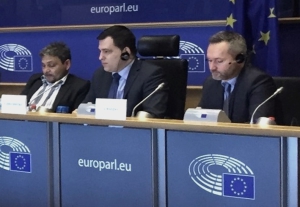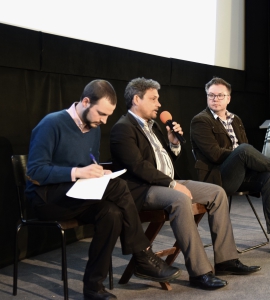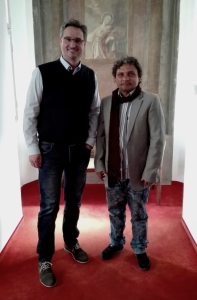Niober Garcia Fournier is not a well-known Cuban dissident, nor is he someone used to traveling all the time and giving speeches at European institutions. In his native Guantanamo, almost a thousand kilometers from the capital, he regularly suffers from eastern-style repression and marginalization. An inseparable part of his life is his contact with grassroots activists on a day-to-day basis. Detentions, house searches and intimidation conducted by the state authorities are not uncommon for him, but a reality that he has to face every day.

He has opted for something unusual. To remain a grassroot activist, sharing the everyday hardships and risks of people working on that level, but at the same time to speak out publicly, using his own name, showing his own face. He decided not to stay in the background and took the lead on EYE on CUBA, a platform which monitors and publishes human rights abuses on the island in order to inform the public about what is really going on in Cuba.
Garcia Fournier just returned from his first big trip abroad to Brussels and Prague. His mission was clear – to raise the awareness of the European public and turn its attention to the latest developments in Cuba. The mere fact that he is not the type of individual that people generally picture when they think of a “Cuban dissident” or “Cuban activist”, often made him more interesting to people and fed the public’s curiosity.

“Nowadays there are 21 public Wi-Fi points in Guantanamo where we pay at least 1.50 CUC (USD) per hour. Just to get an idea, wages in Cuba average about 20 CUC (USD) per month. Having the Internet at home remains a privilege of foreigners residing in Cuba and some companies. For locals, it is simply illegal. While access to the Internet via public Wi-Fi has improved since 2015, it is insufficient when one takes into account that the province has a population of more than half million,” explained Garcia Fournier at an international conference held in Prague – Democracy in the Digital Age. “While collecting and processing the data for EYE on CUBA, one has to work very cautiously and be respectful about the sensitive nature and the impact the publishing of such information can potentially have. This includes following at least the basic rules of digital security such as encryption,” added Garcia Fournier.
“The relative improvement in Cuba-USA and Cuba-EU relations is in reality a curtain that has helped to hide the growing amount of repression against Cuban civil society,” said Garcia Fournier during the routable discussion in the European Parliament Cuba One Year After: at a Crossroads in History. While some found this to be a provocative statement, for him it describes the everyday reality that he has faced since President Obama’s visit in March 2016.

A cultural highlight of the trip was Fournier’s participation at the One World Human Rights Documentary Film Festival, which is held every year in Prague and Brussels. He was invited as a speaker for the public discussion that followed the screening of the documentary film Transit Havana. The film shows the Cuban reality from the perspective of transgender people incorporated into Mariela Castro’s program supporting LGBT rights. “How does being an LGBT activist and simultaneously a vocal supporter of a regime abusing human rights go together?” was one of the first questions asked from the public. A question which is extremely hard to answer, but one that reveals the distorted essence of the current Cuban regime.
All the meetings and events which Niober Garcia Fournier attended had one thing in common. It showed that the European public wants to be informed about what is really going on in Cuba. And that much more if there is the possibility of hearing the first-hand accounts of somebody who has to cope with confrontation by the regime on a daily basis for merely trying to achieve the goals that he believes in.

Leave a comment